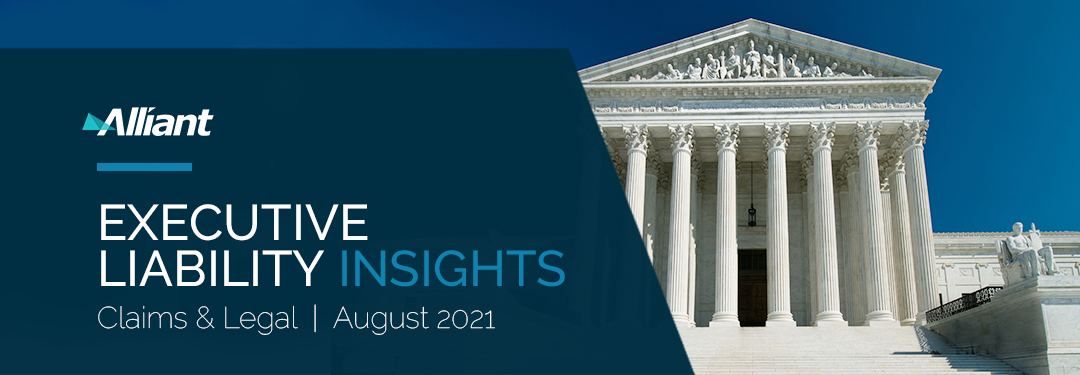
Navigating today’s complex risk environment can be a monumental task. Steve Shappell, Alliant Claims & Legal, spearheads Executive Liability Insights, a monthly review of news, legal developments and information on executive liability, cyber risk, employment practices liability, class action trends and more.
Table of Contents
SETTLEMENTS IN SECURITIES FRAUD SUITS NOT COVERED LOSS UNDER D&O POLICY
Joy Global Inc. v. Columbia Cas. Co., No. 2:18-CV-02034 (E.D. Wis. Aug. 18, 2021)
This coverage litigation arose after a manufacturer of refinery equipment announced a potential agreement to be acquired. Subsequently, several shareholder lawsuits were filed against the manufacturer and its directors and officers challenging their representations and conduct with respect to the proposed sale and alleging they had issued a false or misleading proxy report.
Read More >>
D&O INSURER MUST ADVANCE DEFENSE COSTS FOR INVESTIGATION OF FALSE CLAIMS ACT VIOLATIONS
Guaranteed Rate, Inc. v. ACE Am. Ins. Co., No. N20C-04-268 MMJ CCLD (Del. Sup. Ct. Aug. 18, 2021)
A mortgage company received a civil investigative demand from the U.S. Attorney’s Office for the Northern District of New York and the U.S. Department of Justice, which alleged False Claims Act violations in relation to the company’s underwriting and issuance of federally-insured mortgage loans.
Read More >>
DELAWARE JUDGE DECLINES TO DISMISS POLICYHOLDER LAWSUIT ALLEGING D&O INSURER WRONGFULLY DENIED COVERAGE
CVR Refining, LP v. XL Specialty Ins. Co., No. N21C-01-260 EMD CCLD (Del. Super. Ct. Aug. 11, 2021)
The case at hand arose after two sets of investors brought suit in both the Delaware Chancery Court and New York Federal Court claiming a Texas petroleum refining company and two of its executives manipulated the stock price to the energy company’s benefit.
Read More >>
DEMAND FOR ARBITRATION IS A CLAIM UNDER D&O POLICY
Supima v. Philadelphia Indem. Ins. Co., No. 20-617 (D. Ariz. June 16, 2021)
In the underlying matter, the insured, a nonprofit, received a demand letter from a wholesale company advising it wanted to arbitrate a dispute pursuant to a license agreement it had with the insured.
Read More >>
DIRECTOR DEFENDANTS NOT ‘NECESSARY AND INDISPENSABLE’ PARTIES IN COVERAGE LITIGATION AGAINST D&O INSURER
LRN Corp. v. Markel Ins. Co., et al., No. 20-cv-8431 (S.D.N.Y. Aug. 23, 2021)
In the underlying suit, a minority shareholder filed a complaint against a consulting company and three of its directors alleging the defendants orchestrated a scheme to reduce the outstanding shares and gain control of the company prior to a planned, but unannounced, merger.
Read More >>
SELLING UNREGISTERED SECURITIES CONSTITUTES PROFESSIONAL SERVICES UNDER PROFESSIONAL LIABILITY POLICY
Saoud v. Everest Indem. Ins. Co., No. 19-12389 (E.D. Mich. Jul. 28, 2021)
An insured retirement planning firm that was not licensed to sell securities sold a “memorandum of indebtedness” to several of its clients. The memoranda were an accounts receivable/lending scheme developed by a non-related company that was not registered as a security with the U.S. Securities and Exchange Commission (“SEC”).
Read More >>
HOLD THE LINE ON HOLDER CLAIMS
Hussein v. Razin, et al., No. 30-2013-00679600 (N.J. Super. Ct. Jul. 29, 2021)
In a rare “holder” claim under the California Securities Laws, a jury found a healthcare technology company and its directors and officers not liable for making false and misleading statements, causing the company’s second largest investor to forego selling his shares.
Read More >>
SINGLE LAWSUIT CONTAINS MULTIPLE CLAIMS UNDER D&O POLICY
Stem, Inc. v. Scottsdale Ins. Co., 2021 WL 1736823 (N.D. Cal. July 30, 2021)
As discussed in the June 2021 edition of Executive Liability Insights, the U.S. District Court for the Northern District of California determined that two causes of action contained in one lawsuit constituted separate claims, even though a directors and officers liability (“D&O”) policy defined “Claim” as a “civil proceeding” or a “written demand.”
Read More >>
PRIVATE EQUITY FIRM AND POST-MERGER ENTITY MUST FACE INVESTOR SUIT
Hedick, et al. v. The Kraft Heinz Co., et al., No. 19-cv-1339 (N.D. Ill. Aug. 11, 2021)
A private equity firm and an American food conglomerate did not succeed in dismissing a securities class action alleging the company made false and misleading statements in violation of Section 10b and 20(a) of the Securities Exchange Act of 1934 and Rule 10b-5.
Read More >>
MUTUAL FUND SERVICE FEES THAT ARE PRODUCT OF ARM’S LENGTH BARGAINING DO NOT BREACH FIDUCIARY DUTY
Obeslo v. Great-West Life & Annuity Ins. Co., No. 20-1310 (10th Cir. Jul. 26, 2021)
Plaintiff shareholders brought an action against the investment advisor of their employer sponsored retirement plan’s mutual fund, alleging breach of fiduciary duty for charging excessive fees. They claimed that both the advisory and administrative fees charged to the index and bond funds were so disproportionate to the services rendered that they violated the Investment Company Act of 1940 (“ICA”).
Read More >>
TECH COMPANY’S UNFAIR COMPETITION SUIT TOSSED WITHOUT LEAVE TO AMEND
Enigma Software Grp. USA LLC v. Malwarebytes Inc., No. 5:17-cv-02915-EJD (N.D. Cal. Aug. 9, 2021)
A cybersecurity software company’s unfair competition lawsuit against a rival internet security company, previously cited by both a U.S. Supreme Court justice and the Trump Administration’s Department of Justice in the backlash against the so-called “Big Tech liability shield,” was recently tossed without leave to amend by a California court.
Read More >>
COVERAGE FOR MEMBER OF INSURED LLC NOT BARRED BY INSURED VS. INSURED EXCLUSION IN D&O POLICY
Starr Indem. & Liab. Co. v. Point Ruston LLC, No. C20-5539RSL (W.D. Wash. Aug. 17, 2021)
A Washington federal district court recently held that an insurer did not meet its burden of showing that coverage for a lawsuit stemming from alleged mismanagement of entities involved in a commercial development project was barred by the insured vs. insured (“IvI”) exclusion in a directors and officers (“D&O”) liability policy.
Read More >>
DERIVATIVE CLAIMS EXPOSE TOP EXECUTIVES TO LIABILITY
Directors and officers of corporations have access to funds as well as sensitive and often potentially lucrative information. Utilization of these funds and information to the sole benefit of the executive, aside from risking potential insider trading violations, exposes the company and its executives to, among other things, shareholder derivative actions.
Read More>>
APPRAISAL ACTION NOT A CLAIM FOR WRONGFUL ACT UNDER D&O POLICY
Jarden, LLC v. ACE Am. Ins. Co., et al., No. N20C-03-112 AML CCLD (Del. Super. Jul. 30, 2021)
A consumer products company entered into a merger agreement, and while the majority of the company’s stockholders approved the merger, several filed appraisal petitions in the Delaware Chancery Court.
Read More>>
CYBER CORNER
Click to read the following cases:
- EMPLOYEES HAVE STANDING TO SUE EMPLOYER AND IT VENDOR OVER DATA BREACH: In re GE/CBPS Data Breach Litig., No. 1:20-cv-02903-KPF (S.D.N.Y Aug. 4, 2021)
- SETTLEMENT OF FINTECH PRIVACY SUIT A BOON TO PLAINTIFFS’ BAR: In re: Plaid Inc. Privacy Litig., No. 20-3056 (N.D. Cal. Aug. 5, 2021)
- PROTECTING FORENSIC REPORTS FROM DISCOVERY KEEPS GETTING HARDER: In re Rutter’s Data Breach Sec. Litig., No. 1:20-CV-382 (E.D. Pa. Jul. 22, 2021)
- ARE GIFT CARDS AS GOOD AS CASH?: In re WaWa, Inc. Data Sec. Litig., No. 19-6019 (E.D. Pa. Jul. 30, 2021)
EPL CORNER
Click to read the following cases:
- Mendoza v. Fonseca McElroy Grinding Co., Inc., Case No. S253574 (Cal. Aug. 16, 2021)
- Busker v. Wabtec Corp., Case No. S251135 (Cal. Aug. 16, 2021)
- Botta v. PwC, et al., No. 3:18-cv-0261 (N.D. Cal. Jul. 26, 2021)
- Hobby Lobby Stores, Inc. v. Sommerville, No. 2-19-0362 (Ill. App. Ct. Aug. 13, 2021)
- Carrone v. UnitedHealth Grp., Inc. et al., No. 20-2742 (3rd Cir. Aug. 11, 2021)
- Castellanos v. State of California, et al., No. S266551 (Cal. Super. Aug. 20, 2021)
SEC CORNER
Click to read the following cases:
- Alliance for Fair Board Recruitment v. SEC, No. 21-60626 (5th Cir. Aug. 10, 2021)
- SEC STRESSES TIMELY NOTICE OF CYBER INCIDENTS TO INVESTORS
- FURTHER EVIDENCE THAT CYBER RISK IS A BOARD-LEVEL ISSUE
- SEC’S EMPHASIS ON CONTINGENT LIABILITIES ENDURES
- AUGUST 2021 NOTEWORTHY ENFORCEMENT ACTIONS FILED
SHAREHOLDER CORNER
2021 SECURITIES CLASS ACTION FILINGS UPDATE
SETTLEMENTS IN SECURITIES FRAUD SUITS NOT COVERED LOSS UNDER D&O POLICY
Joy Global Inc. v. Columbia Cas. Co., No. 2:18-CV-02034 (E.D. Wis. Aug. 18, 2021)
This coverage litigation arose after a manufacturer of refinery equipment announced a potential agreement to be acquired.
Subsequently, several shareholder lawsuits were filed against the manufacturer and its directors and officers challenging their representations and conduct with respect to the proposed sale and alleging they had issued a false or misleading proxy report. All but one suit settled prior to the close of the transaction and the remaining complaint was amended post-merger to allege the misrepresentations in the proxy statement were made to induce shareholders to accept the transaction for an inadequate share price consideration.
The lawsuit eventually settled and the manufacturer sought coverage under its directors and officers liability (“D&O”) policy. The D&O insurer agreed to reimburse defense costs but denied coverage for the settlements, citing carve-out language in the definition of “Loss” that precluded coverage for “any amount of any judgment or settlement of any Inadequate Consideration Claim,” which the policy defined as “that part of any Claim alleging that the price or consideration paid … for the acquisition … of all or substantially all of … an entity is inadequate.”
The manufacturer argued the settlements should be covered because there were allegations pertaining to misrepresentations, in addition to inadequate share price. In rejecting the manufacturer’s arguments, the Eastern District of Wisconsin held there was no reasonable expectation of coverage based on the “clear and unambiguous” language of the policy, noting that “each cause of action within [all of] the [underlying] suits relied on … allegations of inadequate consideration,” and as such, the entirety of each of the underlying suits were “part of [a] Claim alleging … inadequate consideration.”
The court further refused to apply the recent ruling in Northrup Grumman where a Delaware trial court found similar policy language required that the allegations only pertain to inadequate share price consideration and “nothing else” to fall outside the scope of coverage. The Wisconsin court found the Delaware court’s reasoning in Northrup Grumman to be “unpersuasive,” stating the clear language of the carve-out did not address the requirement that inadequate consideration be the only allegation. The court further observed that Wisconsin law did not license it “to rewrite unambiguous policy language.”

The Takeaway
As this case highlights, careful attention must be paid to the provisions of the definition of “Loss.” It is vital to ensure the language is expansive and does not limit coverage for settlements where that is not the intent.
D&O INSURER MUST ADVANCE DEFENSE COSTS FOR INVESTIGATION OF FALSE CLAIMS ACT VIOLATIONS
Guaranteed Rate, Inc. v. ACE Am. Ins. Co., No. N20C-04-268 MMJ CCLD (Del. Sup. Ct. Aug. 18, 2021)
A mortgage company received a civil investigative demand from the U.S. Attorney’s Office for the Northern District of New York and the U.S. Department of Justice, which alleged False Claims Act violations in relation to the company’s underwriting and issuance of federally-insured mortgage loans.

The mortgage company promptly tendered the civil investigative demand under its private company management liability policy. Several months later, after the investigation concluded, the mortgage company requested reimbursement from its insurer, but the insurer denied coverage and litigation ensued.
The insurer argued the civil investigative demand was not a “Claim” under the policy, and that, in addition to failing to establish that defense costs had fully eroded the retention, the mortgage company should have requested advancement of defense costs prior to the disposition of the investigation. The court disagreed with the insurer’s argument on all counts, first noting the civil investigative demand was a “Claim” under the policy because the alleged violations of the False Claims Act would clearly be a “Wrongful Act.” According to the court, the insurer was required to provide coverage "whenever a complaint against the insured, read as a whole and with all reasonable inferences made in light most favorable to the policy holder, alleges facts that potentially fall within the scope of coverage." Moreover, because the civil investigative demand and related investigation constituted a “Claim,” the duty to advance defense costs under the policy was triggered.
The insurer further contended the policy’s professional services exclusion applied to preclude coverage because the underwriting and mortgage origination activities at issue in the civil investigative demand were considered professional services. The professional services exclusion precluded coverage for “Loss on account of any Claim ... alleging, based upon, arising out of, or attributable to any Insured's rendering or failure to render professional services;” however, the term “professional services” was not defined in the policy. Again, the court disagreed with the insurer, finding the broad nature of the professional services exclusion and the policy’s failure to define “professional services” meant “the exclusion must be interpreted narrowly in favor of coverage.” The court reasoned that because the mortgage company “was in the business of underwriting and issuing loans to borrowers,” and “the Wrongful Acts alleged in the underlying investigation involve[d] … federally-insured loans that failed to meet applicable quality-control standards,” which was a duty that was owed to the federal government, compliance with such standards was not a professional service provided directly to borrowers such that the exclusion would apply.
The Takeaway
This case presents a significant win for insureds when it comes to coverage for False Claims Act violations, or any other government investigation costs. As the federal government’s primary tool for combatting fraud, False Claims Act enforcement is not an insignificant exposure for companies, particularly in the wake of the COVID-19 pandemic, and the Delaware Superior Court is only the latest in a growing list of courts to have found “no distinction between the investigation of, or actually alleging, an unlawful act.” Accordingly, many courts consider government subpoenas and similar investigation demands requesting testimony or documents to be “Claims” under standard directors and officers liability (“D&O”) policy language. Despite the positive outcome, this case also serves as a reminder of the importance of narrowly drafted exclusionary language in D&O policies to avoid needlessly eliminating coverage by leaving an exclusion’s application open to interpretation.
DELAWARE JUDGE DECLINES TO DISMISS POLICYHOLDER LAWSUIT ALLEGING D&O INSURER WRONGFULLY DENIED COVERAGE
CVR Refining, LP v. XL Specialty Ins. Co., No. N21C-01-260 EMD CCLD (Del. Super. Ct. Aug. 11, 2021)

The case at hand arose after two sets of investors brought suit in both the Delaware Chancery Court and New York Federal Court claiming a Texas petroleum refining company and two of its executives manipulated the stock price to the energy company’s benefit.
The suits were tendered to the company’s directors and officers liability (“D&O”) program and the primary insurer issued a coverage letter noting there may be coverage available for the energy company, but there was no coverage for the individual executives named in the lawsuits.
The energy company continued to defend itself and eventually a mediation was scheduled in one of the investor suits. Upon learning of the upcoming mediation, and nearly two years after issuing its initial coverage position, the primary D&O insurer notified the energy company that the matter was “probably not covered” as it principally arose out of the contractual relationship between the parties, and thus, the breach of contract exclusion applied. The energy company accused the insurers of bad faith and anticipatory breach of contract and, in a mad dash to the courthouse, the insurers filed suit in Texas state court just three days before to the insureds’ coverage complaint was filed in Delaware.
The insurers argued the Delaware action should be dismissed in favor of the “first filed” Texas action, which they asserted involved the same parties and coverage dispute. In spurning this argument, a Delaware Superior Court Judge refused to allow the insurers to control the forum for the coverage dispute solely based on timing. "While the Texas action was filed three days before this civil proceeding,” the judge noted, “merely using a timeline is not how to legally analyze the issue." The judge further found that per Delaware law, cases filed close in time can be considered “contemporaneous” for purposes of determining the appropriate forum, and the first filed suit is not given deference if it is filed in anticipation of a lawsuit by “natural plaintiffs.” The court went on to state that the insureds were natural plaintiffs for purposes of this dispute.
The Takeaway
This ruling and many other recent rulings illustrate the importance of having iron-clad policy language lay out, in no uncertain terms, the forum for coverage disputes.
DEMAND FOR ARBITRATION IS A CLAIM UNDER D&O POLICY
Supima v. Philadelphia Indem. Ins. Co., No. 20-617 (D. Ariz. June 16, 2021)

In the underlying matter, the insured, a nonprofit, received a demand letter from a wholesale company advising it wanted to arbitrate a dispute pursuant to a license agreement it had with the insured. Over the next several months, the insured and the wholesale company communicated regarding potential arbitrators and other issues.
Several years later, the insured received a Statement of Claim, which the wholesale company filed with an alternative dispute resolution organization. The insured provided notice of the Statement of Claim to its directors and officers liability (“D&O”) insurer under the policy in effect at the time the insured had received the Statement of Claim. The insurer, however, denied coverage for late notice, arguing the arbitration demand letter, which was received in a prior policy period, was a “Claim,” despite not being reported until the current policy period. Coverage litigation ensued.
The D&O policy defined “Claim” to be a “written demand for monetary or non-monetary relief” or a “judicial, civil, administrative, regulatory, or arbitration proceeding.” The policy further provided “In the event that a Claim is made against the Insured ... the Insured shall, as a condition precedent to the obligations of the Underwriter under this Policy, give written notice of such Claim ... as soon as practicable … during this Policy Period … but, not later than 60 days after the expiration date of this Policy.”
The insured argued the initial letter was not a "Claim" because it contained no demands for monetary or nonmonetary relief, the Statement of Claim was a separate “Claim,” and the policy did not require a “Claim” to be first made during the policy period. The court, however, disagreed, finding the demand letter “clearly gave [the insured] notice in a record of [the wholesaler’s] intent to arbitrate in the agreed manner set forth in the Licensing Agreement.” Therefore, the court concluded the arbitration proceeding was initiated at the time the demand letter was received, making the letter a “Claim” under the D&O policy in place at that time. Moreover, the policy’s notice provision was clear and unambiguous, and, according to the court, the insured should have been aware that notice of the arbitration demand letter was required. The court also held the Statement of Claim was not a separate "Claim" and rejected the insured’s argument that the policy did not require the claim be first made during the policy period.
The Takeaway
Timely noticing of claims under claims-made-and-reported policies is vital to securing coverage and avoiding litigation. As the court here noted, insurers need not show prejudice when notice is not timely provided under a claims-made policy because “requiring the insurer to show prejudice would constitute an extension of coverage not contemplated in the original policy.”
DIRECTOR DEFENDANTS NOT ‘NECESSARY AND INDISPENSABLE’ PARTIES IN COVERAGE LITIGATION AGAINST D&O INSURER
LRN Corp. v. Markel Ins. Co., et al., No. 20-cv-8431 (S.D.N.Y. Aug. 23, 2021)
In the underlying suit, a minority shareholder filed a complaint against a consulting company and three of its directors alleging the defendants orchestrated a scheme to reduce the outstanding shares and gain control of the company prior to a planned, but unannounced, merger.

The shareholder specifically alleged the defendants completed an improper “self-tender” of shares at an unfair price, materially increasing the value of shares held by the defendants. The company and the director defendants tendered the suit to their directors and officers liability (“D&O”) insurer but the insurer denied coverage, citing the policy’s securities transaction exclusion. Shortly after the underlying suit was filed, the company obtained a dismissal of the case and only the three director defendants remained.
The company sought a reversal of the D&O insurer’s denial and coverage litigation ensued, but the company did not include the three directors as plaintiffs in the suit it filed against its insurer. The D&O insurer asked the court to dismiss the suit, arguing that since the company was dismissed as a defendant in the underlying suit, the three directors were necessary and indispensable parties to the dispute because they were the only defendants seeking coverage.
The court disagreed with the insurer, however, and allowed the company to fight the coverage battle without involving the individuals. Regardless of whether the directors were defendants in the case, the court found it could determine whether the securities transaction exclusion applied, and thus, could decide whether the insurer’s denial of coverage was proper. Since the company could obtain complete relief without joining the directors, the directors were not necessary and indispensable to the coverage litigation, the court found, therefore allowing the case to progress to discovery and further litigation as to the merits of the coverage denial.
The Takeaway
Directors seek to avoid claims being made against them, but it is inevitable that it will happen once in a while. In such instances, these individuals take comfort when a D&O insurer stands behind them with protection. At times, however, insurers unjustly disclaim their obligations, forcing insureds to fight for coverage. The resulting coverage litigation may be time-consuming and stressful for those involved, so to the extent corporate policyholders can litigate coverage disputes without involving individual defendants, it would be an efficient and desirable outcome.
SELLING UNREGISTERED SECURITIES CONSTITUTES PROFESSIONAL SERVICES UNDER PROFESSIONAL LIABILITY POLICY
Saoud v. Everest Indem. Ins. Co., No. 19-12389 (E.D. Mich. Jul. 28, 2021)
An insured retirement planning firm that was not licensed to sell securities sold a “memorandum of indebtedness” to several of its clients. The memoranda were an accounts receivable/lending scheme developed by a non-related company that was not registered as a security with the U.S. Securities and Exchange Commission (“SEC”).

The non-related company later went bankrupt and, along with its CEO, was sued by the SEC for, among other things, selling unregistered securities.
Several months into selling the memoranda, the retirement planning firm received a cease-and-desist order from the Michigan Department of Licensing and Regulatory Affairs, as well as a subpoena from the SEC and lawsuits from three separate clients alleging the sale of unregistered securities. When the firm tendered the claim to its professional liability insurer, the insurer responded with a letter stating that there may be coverage for the claim, but followed up later that day with an email indicating the opposite. The retirement planning firm wrote several letters to the insurer asking for a response regarding coverage and advising of an upcoming mediation but heard nothing and the suits were eventually settled without participation from the insurer. Coverage litigation ensued when the firm sought reimbursement of defense costs and settlement amounts.
The insurer argued coverage was precluded because the claims did not involve the insured providing “Professional Services” as required by the insuring agreement. The court, however, noted that Michigan does not follow the “8 corners approach” of many other jurisdictions, which dictates “courts deciding whether an insurer has a duty to defend a claim examine only the allegations of the underlying complaint and the insurance policy.” Accordingly, the court was not limited to analyzing merely the allegations in the complaints in order to determine coverage, and allowed the firm to rely on an affidavit from the underlying lawsuits that suggested the discussion about the memoranda occurred during a discussion about retirement services. As retirement services were included in the definition of “Professional Services,” the court found in favor of the firm.
The Takeaway
The definition of “Professional Services” is a crucial element of a professional liability insurance policy. It is essential that the definition clearly encompasses all aspects of an insured’s business activities in order to avoid costly and time-consuming coverage litigation.
HOLD THE LINE ON HOLDER CLAIMS
Hussein v. Razin, et al., No. 30-2013-00679600 (N.J. Super. Ct. Jul. 29, 2021)

In a rare “holder” claim under the California Securities Laws, a jury found a healthcare technology company and its directors and officers not liable for making false and misleading statements, causing the company’s second largest investor to forego selling his shares.
The investor alleged that despite the company’s positive public statements concerning its earnings projections, the projections were ultimately retracted and the announcement of disappointing financial results caused the company’s stock price to drop and the investor to suffer substantial damages. According to the investor, had he not relied on the allegedly misleading statements, he would not have held his shares, and would instead have sold them and realized a gain.
In order to hold the company and its executives liable, the jury had to find they made a false representation and that the investor relied on this representation when he made the decision not to sell his shares. The jury, however, found the company and its executives made neither a false representation nor intentionally failed to disclose facts that made a representation deceptive. Therefore, the question of whether the investor relied on this representation was never presented and the investor’s case was tossed.
The Takeaway
“Holder” claims are forbidden by federal securities laws because of their potential for abuse. While there are still some jurisdictions that allow these types of claims under state securities laws, they are few and far between. Plaintiffs in holder cases must allege and plead reliance on misrepresentations and loss causation with specificity, which includes documenting actions that indicate reliance coupled with a speculative calculation of damages.
It is a slippery slope to allow this type of conjecture in the law, which is why the 1975 U.S. Supreme Court decision in Blue Chip Stamps v. Manor Drug Stores forbid it. As Hussein demonstrates, it is important for a directors and officers liability policy to provide broad coverage for directors and officers accused of wrongdoing and to ensure the wrongful acts of others do not jeopardize coverage for innocent insureds.
SINGLE LAWSUIT CONTAINS MULTIPLE CLAIMS UNDER D&O POLICY
Stem, Inc. v. Scottsdale Ins. Co., 2021 WL 1736823 (N.D. Cal. July 30, 2021)
As discussed in the June 2021 edition of Executive Liability Insights, the U.S. District Court for the Northern District of California determined that two causes of action contained in one lawsuit constituted separate claims, even though a directors and officers liability (“D&O”) policy defined “Claim” as a “civil proceeding” or a “written demand.”

The court further found the policy’s interrelated wrongful acts, prior and pending litigation, breach of application, and insured vs. insured exclusions all barred coverage for one of the claims.
In a subsequent motion, the plaintiff recently argued the D&O insurer had an obligation to reimburse the defense fees and costs for the entire lawsuit, not just the fees and costs associated with the covered claim. The insurer disagreed, arguing allocation of the legal invoices is possible because the invoices show the plaintiff has not paid attorneys’ fees relating to the covered claim. The court disagreed with the insurer, however, finding there was not undeniable evidence of the allocability of specific expenses because the lawsuit is still on-going. The court also found the insurer’s liability was not limited to the losses associated with the defendant whose acts were “interrelated,” and therefore the insurer had the obligation to defend the entire action.
PRIVATE EQUITY FIRM AND POST-MERGER ENTITY MUST FACE
INVESTOR SUIT
Hedick, et al. v. The Kraft Heinz Co., et al., No. 19-cv-1339 (N.D. Ill. Aug. 11, 2021)
A private equity firm and an American food conglomerate did not succeed in dismissing a securities class action alleging the company made false and misleading statements in violation of Section 10b and 20(a) of the Securities Exchange Act of 1934 and Rule 10b-5.
In the aftermath of a high-profile merger between two consumer goods brands, which was orchestrated by the private equity firm, the post-merger entity was subpoenaed by the U.S. Securities and Exchange Commission (“SEC”) for documents related to its accounting practices. The SEC eventually launched an investigation into the company’s accounting practices, and several months later, the company disclosed the SEC investigation to investors along with the fact that it would be writing down the value of its brands by billions of dollars.
Investors filed suit alleging statements the company made concerning post-merger “synergistic” cost cutting practices were false and misleading, damaged the brand/product quality as well as its supply chain, and ultimately resulted in a decline in sales and an impairment to goodwill. The suit also alleged that had the SEC not initiated a probe into the company’s accounting practices, the goodwill impairment would not have been disclosed.
The company and the private equity firm argued the investor suit was merely a hindsight attack on a business strategy that failed to pan out, but the court disagreed, noting the suit sufficiently suggested the company's executives knew, or recklessly disregarded, that its public statements were false. The court also noted the actions taken by the private equity firm in furtherance of the merger amounted to control over the company. For example, upon completion of the merger, the firm owned 25% of the outstanding stock and had placed more than half of its partners on the board or into executive positions at the company. These facts taken together were enough to establish that the firm had control of the company’s operations, the court said. Accordingly, in response to the allegation that the private equity firm violated section 20(a) of the Securities Exchange Act of 1934 as “controlling persons,” the court held the issue of control person liability is a “fact-intensive inquiry” and should not be resolved by a dismissal motion.
MUTUAL FUND SERVICE FEES THAT ARE PRODUCT OF ARM’S LENGTH BARGAINING DO NOT BREACH FIDUCIARY DUTY
Obeslo v. Great-West Life & Annuity Ins. Co., No. 20-1310 (10th Cir. Jul. 26, 2021)
Plaintiff shareholders brought an action against the investment advisor of their employer sponsored retirement plan’s mutual fund, alleging breach of fiduciary duty for charging excessive fees. They claimed that both the advisory and administrative fees charged to the index and bond funds were so disproportionate to the services rendered that they violated the Investment Company Act of 1940 (“ICA”).

Mutual funds are regulated by ICA, which imposes a fiduciary duty on investment advisers with respect to the compensation they receive for providing services to mutual funds. The U.S. Supreme Court has held that, in order for an investment adviser to face liability, “the adviser must charge a fee that is so disproportionately large that it bears no reasonable relationship to the services rendered and could not have been the product of arm's length bargaining.” Factors considered in determining whether fees are the result of an arm’s length bargain include the nature and quality of the services, the profitability of the fund to the adviser, the collateral benefits accruing to the investment adviser due to the fund, economies of scale, comparative fee structures, and the independence and conscientiousness of the board.
After taking into consideration the factors above, as well as the persuasive and credible evidence from the investment advisor that their fees were reasonable, the court found the shareholders’ claim failed to establish any damages and, as such, the investment advisor did not breach their fiduciary duties.
The Takeaway
Excessive fee cases against plan fiduciaries are increasing in frequency. Since such cases are often costly to defend and hard to dismiss, coverage through fiduciary liability insurance is essential.
TECH COMPANY’S UNFAIR COMPETITION SUIT TOSSED WITHOUT LEAVE TO AMEND
Enigma Software Grp. USA LLC v. Malwarebytes Inc., No. 5:17-cv-02915-EJD (N.D. Cal. Aug. 9, 2021)

A cybersecurity software company’s unfair competition lawsuit against a rival internet security company, previously cited by both a U.S. Supreme Court justice and the Trump Administration’s Department of Justice in the backlash against the so-called “Big Tech liability shield,” was recently tossed without leave to amend by a California court.
The suit had previously been revived by the Ninth Circuit, where the cybersecurity software company alleged its competitor committed Lanham Act unfair advertising violations when the competitor’s security software began identifying the company’s security products as potentially unwanted on users' computers.
Departing from the Ninth Circuit’s focus on section 230 of the Communications Decency Act, which safeguards online companies from liability for content moderation practices and content posted by third parties, but which the Ninth Circuit said does not cover conduct “driven by anticompetitive animus,” the U.S. District Judge found the competitor was in the clear for flagging the software. In turning his analysis to the Lanham Act, the judge found the cybersecurity software company failed to plead that its competitor’s “alleged labels [were] verifiably false rather than subjective opinions.” Lanham Act claims can only go after false and deceptive statements, the judge said, noting the cybersecurity software company’s allegations disregarded that its competitor’s users were ”aware of why it opines that a given software program may be a [potentially unwanted program] based on [its competitor’s] disclosed criteria and can choose to quarantine or unquarantined the detected program.”
The Takeaway
The most interesting part of this opinion, and the reason it has been on everyone’s radar, is the U.S. Supreme Court’s refusal to accept the earlier petition by the defendant to overturn the Ninth Circuit’s opinion. It was widely viewed as a missed opportunity to reign in what has been perceived as tech company immunity from anti-trust claims. While, as the court here stated, this may not be the case to provide further guidance, we will continue to monitor the evolving law on this topic.
COVERAGE FOR MEMBER OF INSURED LLC NOT BARRED BY INSURED VS. INSURED EXCLUSION IN D&O POLICY
Starr Indem. & Liab. Co. v. Point Ruston LLC, No. C20-5539RSL (W.D. Wash. Aug. 17, 2021)
A Washington federal district court recently held that an insurer did not meet its burden of showing that coverage for a lawsuit stemming from alleged mismanagement of entities involved in a commercial development project was barred by the insured vs. insured (“IvI”) exclusion in a directors and officers (“D&O”) liability policy.

The principals of the firms involved in the development project were family members who formed several corporations. Through those corporations, the family members invested in an LLC (the “Project LLC”) that was formed for purposes of running the project. The members of the Project LLC consisted of one of the family corporations, as well as another LLC (the “Manager LLC”) formed by the project’s primary developer and manager. When the developer mismanaged the project, the corporations brought suit against the Project LLC, the Manager LLC, and several other entities alleging breach of fiduciary duty and seeking dissolution of the Project LLC.
The Manager LLC provided notice of the matter to its D&O insurer, which denied coverage, citing the IvI exclusion. The insurer argued it had no duty to defend or indemnify because the plaintiff family corporation was an insured under the policy and the claim was brought “on behalf of” an insured since the individuals, through its corporate entities, were “Members” of the Manager LLC. The policy defined “Member” as “an owner” of an LLC “who may serve as a Manager.”
The court disagreed with the insurer, finding the definition of “Insured” only meant the “Company” and any “Insured Person.” The court noted that while the policy’s definition of “Insured Person” included any “Executive,” the insurer’s interpretation of the definition of “Executive” was incorrect. The policy defined an “Executive” as any “past, present, or future duly elected or appointed director, officer, trustee, governor, management committee Member or Member of the board of managers.” The insurer contended the phrases “management committee” and “board of managers” conflicted with the definition of “Member,” but the court concluded the definition merely clarified which “Members” qualify as “Executives,” and that not all “Members” are “Managers.”
Lastly, the court noted that in corporate law, LLCs are treated as separate entities from their members, and “the mere fact that an officer or ‘principle’ of a corporation has the potential to benefit from the business entity’s action does not mean that the entity undertook the action ‘on behalf of’ the individual.” Accordingly, the court found that while the family corporation was a “Member” of the LLC, it was not a “management committee Member” nor a “member of the Board of managers,” and therefore did not qualify as an “Insured Person” under the policy. Applying the same reasoning, the court found the other defendants did not qualify as “Insureds” because the LLCs were not acting “on behalf of” their principles.
DERIVATIVE CLAIMS EXPOSE TOP EXECUTIVES TO LIABILITY
MULTIPLE CASES

Directors and officers of corporations have access to funds as well as sensitive and often potentially lucrative information. Utilization of these funds and information to the sole benefit of the executive, aside from risking potential insider trading violations, exposes the company and its executives to, among other things, shareholder derivative actions. In several recent Delaware cases, executives withheld funds, manipulated the United States Postal Service reseller program, provided false or misleading public statements, and inflated financial and data measurements to inflate advertising, product, and stock prices, resulting in harm to shareholders and investors.
- OptimisCorp v. Atkins
- Macomb Cnty. Employees’ Ret. Sys.
- Twitter, Inc. S’holder Derivative Litig.
APPRAISAL ACTION NOT A CLAIM FOR WRONGFUL ACT UNDER
D&O POLICY
Jarden, LLC v. ACE Am. Ins. Co., et al., No. N20C-03-112 AML CCLD (Del. Super. Jul. 30, 2021)
A consumer products company entered into a merger agreement, and while the majority of the company’s stockholders approved the merger, several filed appraisal petitions in the Delaware Chancery Court.
The company noticed the actions under its run-off directors and officers liability (“D&O”) program, seeking coverage for defense fees and the interest awarded in the appraisal proceeding. The insurers denied coverage on the grounds the appraisal action was not a claim because it did not seek a remedy for a wrongful act, and coverage litigation ensued.
Siding with the insurers, the court found the appraisal action did not seek compensation for a wrongful act. The court cited to the Delaware Supreme Court holding in In re Solera Insur. Coverage Appeals, which determined that an appraisal proceeding “does not involve any inquiry into claims of wrongdoing.” Instead, the only issue before the appraising court is the value of the dissenting stockholder’s shares on the date of the merger.
Moreover, the acts alleged by the dissenting shareholders did not occur until after the merger was finalized, the court concluded, noting the run-off D&O program under which the appraisal actions were noticed only provided coverage for a securities claim for wrongful acts that occurred prior to the merger. "This conclusion is compelled by the simple fact that, without the merger's execution, no appraisal right exists. If the merger had not closed, none of the dissenting stockholders who submitted appraisal demands would have standing to pursue appraisal," the court noted.

Cyber Corner
GE/CBPS Data Breach Litigation
Plaid Inc. Privacy Litigation
Rutter’s Data Breach Sec. Litigation
WaWa, Inc. Data Sec. Litigation
CALIFORNIA SUPREME COURT CLARIFIES APPLICATION OF STATE’S PREVAILING WAGE LAW
In two recent decisions, the California Supreme Court clarified and limited the scope of the state’s “prevailing wage” law, which requires the basic hourly rate paid on publicly-funded construction projects, or "public works" projects, be paid to a majority of workers engaged in a particular craft, classification, or type of work within the locality.
Mendoza v. Fonseca McElroy Grinding Co., Inc.
Busker v. Wabtec Corp
ADDITIONAL CASES:
Botta v. PwC
Hobby Lobby Stores, Inc. v. Sommerville
Carrone v. UnitedHealth Grp
- Castellanos v. State of California
Shareholder Corner
2021 SECURITIES CLASS ACTION FILINGS UPDATE
In the first half of 2021, plaintiffs filed 112 new securities class action lawsuits in federal and state courts, 25% less than in the second half of 2020, making it the lowest number of filings since the first half of 2015, according to the Cornerstone Research and the Stanford Law School Securities Class Action Clearinghouse report, Securities Class Action Filings—2021 Midyear Assessment. This decline was driven in large part by filings related to mergers and acquisitions, which accounted for only 12 of the 112 filings, a 66% decrease compared to the second half of 2020. One trend that continued from 2020 was the decline in federal and state court class actions alleging claims under the Securities Act of 1933.
The first half of 2021 also saw COVID-19 filings begin to slow, with 60% of the pandemic-related filings occurring in January and February and only 10% in May or June. Of the 10 COVID-19 filings, 5 related to treatments or vaccines that failed to make it to market.
Despite the decline in total filings, federal filings related to special purpose acquisition companies (“SPACs”) doubled in the first half of 2021 compared to all of 2020. Of the 14 SPAC filings in the first half of 2021, more than half alleged the potential targets defrauded investors by misrepresenting their product’s viability. Filings against SPAC-related entities also saw a significant increase in the first half of 2021.
The Energy sector was a big target for plaintiffs in the first half of 2021, with the number of filings doubling from the second half of 2020. Despite this increase, Consumer Non-Cyclical continued to be the most common sector targeted, with 31 filings, of which 13 were in the Biotechnology subsector.
AUGUST 2021 SECURITIES CLASS ACTION FILINGS*
SelectQuote, Inc.
Services
^denotes SPAC-related
*Source: Stanford Law School Securities Class Action Clearinghouse
ABOUT ALLIANT INSURANCE SERVICES
Alliant Insurance Services is the nation’s leading specialty broker. In the face of increasing complexity, our approach is simple: hire the best people and invest extensively in the industries and clients we serve. We operate through national platforms to all specialties. We draw upon our resources from across the country, regardless of where the resource is located.
Contributors

Abbe Darr, Esq.
Claims Attorney
abbe.darr@alliant.com
David Finz, Esq.
Claims Attorney
david.finz@alliant.com
Erica Ahern
Claims Advocate
erica.ahern@alliant.com
Jacqueline Noster, Esq.
Claims Attorney
jacqueline.noster@alliant.com
Jacqueline Vinar, Esq.
Claims Attorney
jacqueline.vinar@alliant.com
Jaimi Berliner, Esq.
Claims Attorney
jaimi.berliner@alliant.com
Katherine Puthota
Claims Advocate
katherine.puthota@alliant.com
Matia Marks, Esq.
Claims Attorney
matia.marks@alliant.com
Meaghan Fisher
Senior Claims Advocate
meaghan.fisher@alliant.com
Megan Padgett
Senior Claims Advocate
megan.padgett@alliant.com
Robert Aratingi
Senior Claims Advocate
robert.aratingi@alliant.com
Robert Hershkowitz, Esq.
Claims Attorney
robert.hershkowitz@alliant.com
Steve Levine, Esq.
Claims Attorney
slevine@alliant.com
Vanessa Gonzalez
Senior Claims Advocate
vanessa.gonzalez@alliant.com